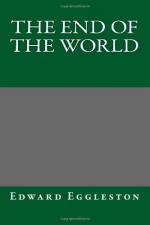The weakest woman and the strongest can faint. It is a woman’s last resort. When all else is gone, that remains. Julia drew a sharp quick breath, and was just about to become unconscious. Humphreys stretched his arms to catch her, but the sudden recollection that in case she fainted he would carry her into the house, produced a reaction. She released herself from his grasp, and hurried in alone, locking her door, and refusing admittance to her mother. From Humphreys, who had put himself into a delicate minor key, Mrs. Anderson got such an account of the conversation as he thought best to give. She then opened and read a note placed into her hand by a neighbor as she came out from meeting. It was addressed to Julia, and ran:
“If all they say is true, you have quickly changed. I do not hold you by any promises you wish to break.
“AUGUST WEHLE.”
Mrs. Anderson had no pity. She hesitated not an instant. Julia’s door was fast. But she went out upon the front upper porch, and pushing up the window of her daughter’s room as remorselessly as she had committed the burglary on her private letter, she looked at her a moment, sobbing on the bed, and then threw the letter into the room, saying: “It’s good for you. Read that, and see what a fellow your Dutchman is.”
Then Mrs. Anderson sought her couch, and slept with a serene sense, of having done her duty as a mother, whatever might be the result.
CHAPTER XIII.
THE SPIDER SPINS.
Julia got up from her bed the moment that her mother had gone. Her first feeling was that her privacy had been shamefully outraged. A true mother should honorably respect the reserve of the little child. But Julia was now a woman, grown, with a woman’s spirit. She rose from her bed, and shut her window with a bang that was meant to be a protest. She then put the tenpenny nail sometimes used to fasten the window down, in its place, as if to say, “Come in, if you can.” Then she pulled out the folds of the chintz curtain, hanging on its draw-string half-way up the window. If there had been any other precaution possible, she would have taken it. But there was not.
She took up the note, and read it. Julia was not a girl of keen penetration. Her training was that of a country life. She did not read between the lines of August’s note, and could only understand that she was dismissed. Outraged by her mother’s tyranny, spurned by her lover, she stood like a hunted creature, brought to bay, looking for the last desperate chance for escape.
Crushed? No. If she had been weaker, if she had been of the quieter, frailer sort, instead of being, as she was, elastic, impulsive, recuperative, she might have been crushed. She was wounded in her heart of hearts, but all her pride and hardihood, of which she had not a little, had now taken up arms against outrageous fortune. She was stung at every thought of August and his letter, of Betsey Malcolm and her victory, of the fact that her mother had read the letter and knew of her humiliation. And she paced the floor of her room, and resolved to resist and to be revenged. She would marry anybody, that she might show Betsey and August they had not broken he heart and that her love did not go begging.




